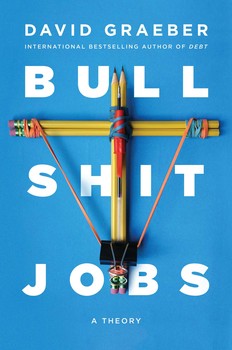read it? is it worth a read?
it doesn’t seem to mention the two most obvious types
-
agents - people whose only job is intermediating, forwarding emails between a business and a customer, but not letting then talk directly. like employment agents who won’t reveal the name of the company, because they know you could just talk to each other directly: the agent knows he is useless.
-
police, military, bouncers - people who spend 99% of their time doing nothing, standing around on street corners. when they do anything, it is only to fight, beat or kill normal working/productive people.
It’s really a great book, but if I were going to recommend Graeber to someone for the first time, I’d probably recommend Debt: The First Five Thousand Years. I think if you’re specifically after what Bullshit Jobs is offering, you’ll enjoy it well enough though. lol I just saw this was two years old.
Didn’t even know Lemmy was two years old tbh, thought it was no more than eighteen months old
OP must not have ready the book then, seems capitalism is still in place.
I don’t exactly follow, but okay!
People who have read this book might want to take a look at this Atlantic article detailing criticism of it—including that research data doesn’t support its claims.
Lmao, that was a terrible critique. Thanks for sharing though, I always enjoy reading opposing viewpoints, even when they’ve no real constructed argument.
I thought the argument was pretty clear: his claims aren’t backed up by the data.
It was less than a page of “critique” trying to address hundreds of pages of research. It doesn’t even pretend to examine his research thoroughly, and focuses on a single survey done, neglecting the entire argument the book makes, and nearly all data it presents.
deleted by creator
deleted by creator
deleted by creator



